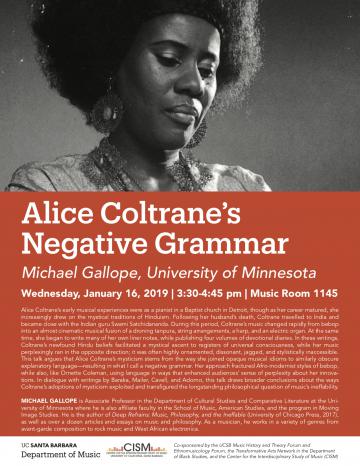Event Date:
Event Location:
- Music Room 1145
Event Price:
Free
Date: Wednesday, January 16, 2019 | 3:30-4:45 pm
Location: Music Room 1145
Alice Coltrane’s early musical experiences were as a pianist in a Baptist church in Detroit, though as her career matured, she increasingly drew on the mystical traditions of Hinduism. Following her husband’s death, Coltrane travelled to India and became close with the Indian guru Swami Satchidananda. During this period, Coltrane’s music changed rapidly from bebop into an almost cinematic musical fusion of a droning tanpura, string arrangements, a harp, and an electric organ. At the same time, she began to write many of her own liner notes, while publishing four volumes of devotional diaries. In these writings, Coltrane’s newfound Hindu beliefs facilitated a mystical ascent to registers of universal consciousness, while her music perplexingly ran in the opposite direction; it was often highly ornamented, dissonant, jagged, and stylistically inaccessible. This talk argues that Alice Coltrane’s mysticism stems from the way she joined opaque musical idioms to similarly obscure explanatory language—resulting in what I call a negative grammar. Her approach fractured Afro-modernist styles of bebop, while also, like Ornette Coleman, using language in ways that enhanced audiences’ sense of perplexity about her innovations. In dialogue with writings by Baraka, Mailer, Cavell, and Adorno, this talk draws broader conclusions about the ways Coltrane’s adoptions of mysticism exploited and transfigured the longstanding philosophical question of music’s ineffability.
MICHAEL GALLOPE is Associate Professor in the Department of Cultural Studies and Comparative Literature at the University of Minnesota where he is also affiliate faculty in the School of Music, American Studies, and the program in Moving Image Studies. He is the author of Deep Refrains: Music, Philosophy, and the Ineffable (University of Chicago Press, 2017), as well as over a dozen articles and essays on music and philosophy. As a musician, he works in a variety of genres from avant-garde composition to rock music and West African electronica.
Co-sponsored by the UCSB Music History and Theory Forum and Ethnomusicology Forum, the Transformative Arts Network in the Department of Black Studies, and the Center for the Interdisciplinary Study of Music (CISM)

